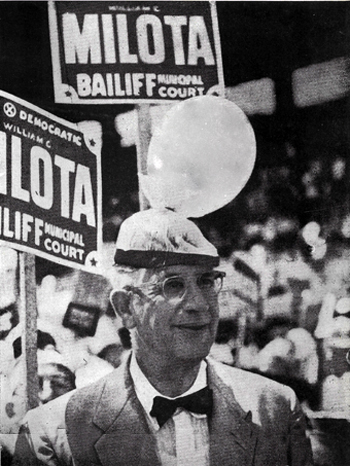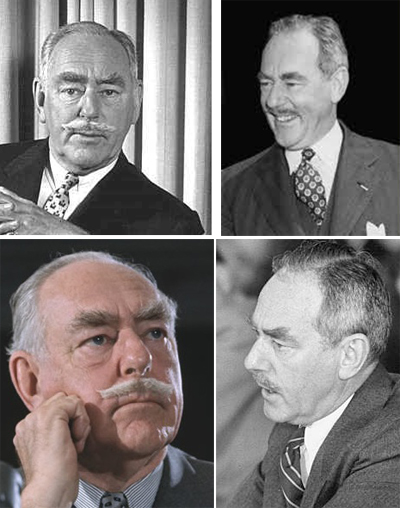Women and Men in Society
 |
 |
 |
 |
 |
 |
 |
Vulgarity & Distinction
in the Political Life of the West
The Roman Senate marked the imagination of all peoples so profoundly that to this day, when one wishes to give an assembly a title that demonstrates its gravity, wisdom, strength and nobility, it is called a Senate. At times Popes give a Sacred College the name of Senate of the Church. In many countries, the Upper House is called the Senate. And the American Founding Fathers, to express the high level they aimed to situate the most illustrious of the two Houses of Congress, gave it the name of Senate.
 What would George Washington and his contemporaries say if they saw this Senator, at left, a fellow countryman, standing in a place of prominence at a party wearing this headpiece to attract attention? Would they see in him the realization of the gravity and nobility of the ancient Roman customs?
What would George Washington and his contemporaries say if they saw this Senator, at left, a fellow countryman, standing in a place of prominence at a party wearing this headpiece to attract attention? Would they see in him the realization of the gravity and nobility of the ancient Roman customs?
Is this the attitude that corresponds to the elevated standing of a public office that confers a high participation in the civil power, which, like all civil power, is of divine origin?
*
But, someone will say, the United States is a new country, and things are naturally like this there.
This is an error. First and foremost, because this evil has a universal root, not just American. It is the vulgarization of men, ideas and things that is taking place because of universal suffrage. Thanks to having to woo the masses in order to lead them, the politician is tempted to become their slave. Hence he becomes vulgar to please the masses.
In our country [Brazil], a candidate for deputy in an electoral campaign in São Paulo, the capital, arranged for a camel with placards imprinted with his name to walk through the popular districts: It is the type of advertising for circuses and clowns. But, if winning depends on calling the attention of the masses to oneself at all costs, aren't these the most direct processes?
It is true that the American people are young, and so are the Brazilian people. But this is not the problem. The public men we had when we were younger were not like this.
 There are still public men who are not like this [this article was written in 1955]. Let us take an example from the Americans. It is Mr. Dean Acheson, Secretary of State under Mr. Truman's government. We do not intend to analyze his political positions here. We are considering him only as a gentleman. What a dignifying contrast he makes with that poor senator above.
There are still public men who are not like this [this article was written in 1955]. Let us take an example from the Americans. It is Mr. Dean Acheson, Secretary of State under Mr. Truman's government. We do not intend to analyze his political positions here. We are considering him only as a gentleman. What a dignifying contrast he makes with that poor senator above.
We picture him here in four different attitudes: top left, thoughtful while analyzing a problem; top right, laughing in a moment of relaxation; bottom left, listening attentively to a speech ; bottom right, structuring some plan of action. To consider only the man as a gentleman: What intelligence, what strength, what calm, what distinction. He is a man of whom an American can be proud.
But, if we were to put the two men – the senator and Mr. Acheson – before the people at a political convention in the United States as in any other country, who would be more likely to win the demagogic and vulgar popularity that today seems the best way leading to victory?
*
We insist: The cause of this vulgarization of so many ambiences, so many customs, and gradually of civilization itself, to a great extent lies in the adoration of numbers, expressed in the merely quantitative universal suffrage against which the Holy Fathers Pius IX and Pius XII spoke so well.



American Senator
Is this the attitude that corresponds to the elevated standing of a public office that confers a high participation in the civil power, which, like all civil power, is of divine origin?
But, someone will say, the United States is a new country, and things are naturally like this there.
This is an error. First and foremost, because this evil has a universal root, not just American. It is the vulgarization of men, ideas and things that is taking place because of universal suffrage. Thanks to having to woo the masses in order to lead them, the politician is tempted to become their slave. Hence he becomes vulgar to please the masses.
In our country [Brazil], a candidate for deputy in an electoral campaign in São Paulo, the capital, arranged for a camel with placards imprinted with his name to walk through the popular districts: It is the type of advertising for circuses and clowns. But, if winning depends on calling the attention of the masses to oneself at all costs, aren't these the most direct processes?
It is true that the American people are young, and so are the Brazilian people. But this is not the problem. The public men we had when we were younger were not like this.

A man should represent the distinction of his office in his personal demeanor and dress
We picture him here in four different attitudes: top left, thoughtful while analyzing a problem; top right, laughing in a moment of relaxation; bottom left, listening attentively to a speech ; bottom right, structuring some plan of action. To consider only the man as a gentleman: What intelligence, what strength, what calm, what distinction. He is a man of whom an American can be proud.
But, if we were to put the two men – the senator and Mr. Acheson – before the people at a political convention in the United States as in any other country, who would be more likely to win the demagogic and vulgar popularity that today seems the best way leading to victory?
We insist: The cause of this vulgarization of so many ambiences, so many customs, and gradually of civilization itself, to a great extent lies in the adoration of numbers, expressed in the merely quantitative universal suffrage against which the Holy Fathers Pius IX and Pius XII spoke so well.

Modern politicians in vulgar dress that appeals to the masses

Catholicismo n. 50 - February 1955
Posted July 27, 2018
Posted July 27, 2018
______________________
______________________








